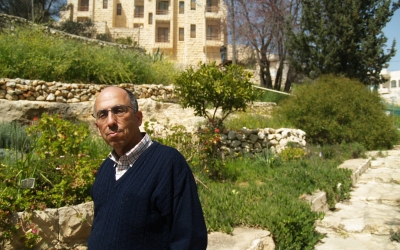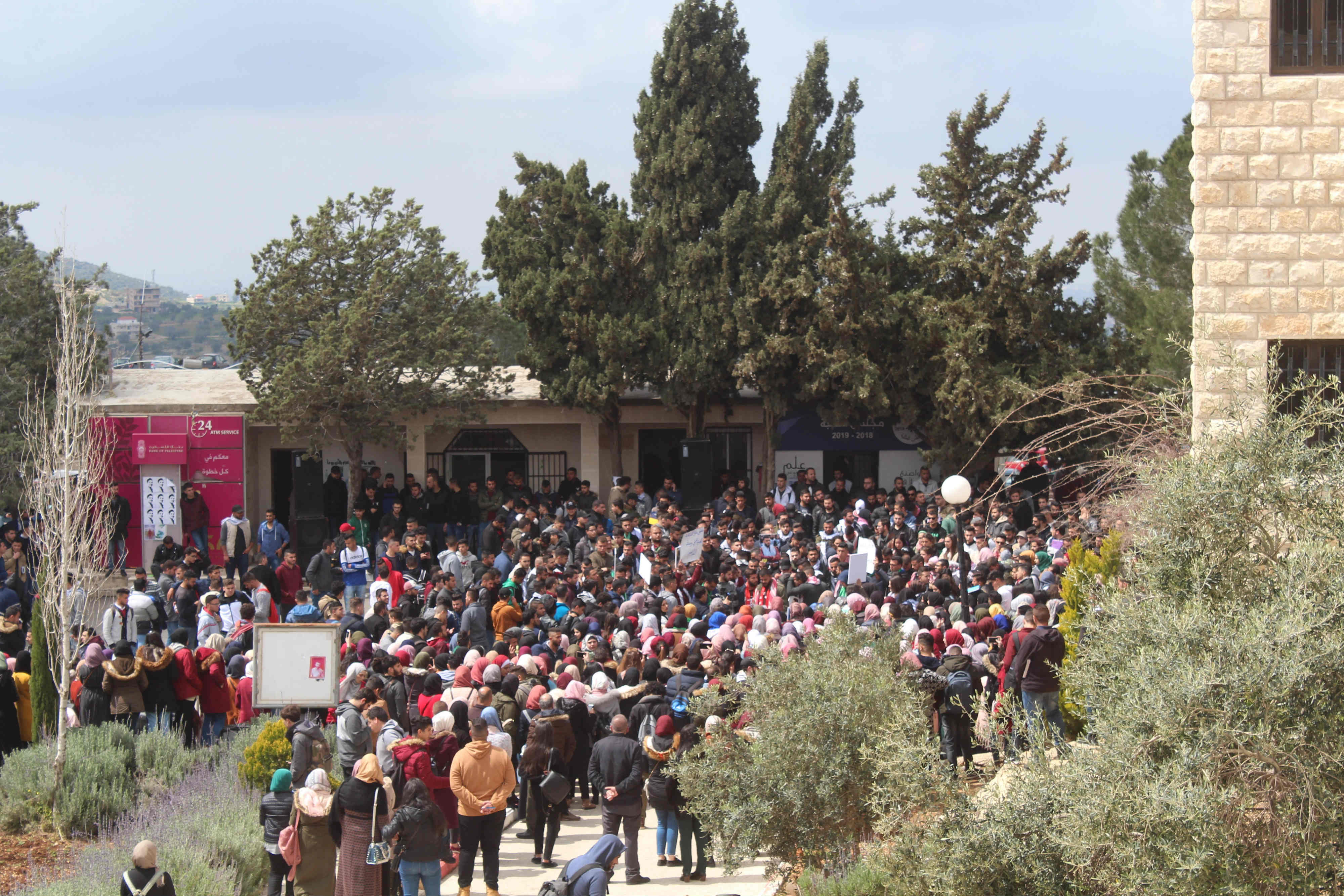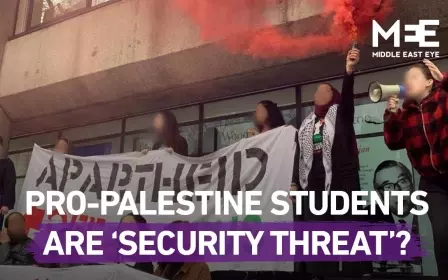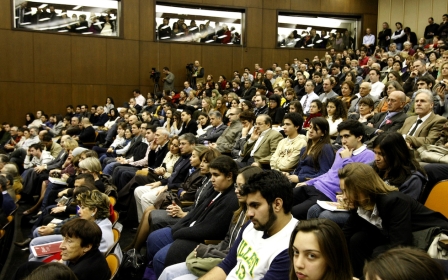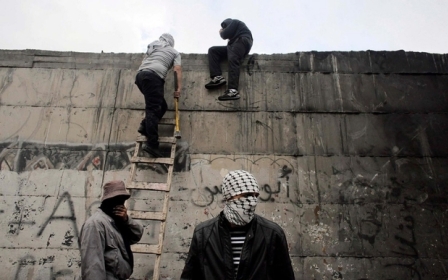Israeli raids on Birzeit campus raise fears for Palestinian students

At around 5.45am, in the morning of 25 March, Birzeit University guards informed their supervisor, Munther Sharaka, that the main campus gate had been opened, and the lock broken.
Once reported, Sharaka said, one of the guards headed towards the western gate, only to find a group of men in civilian clothing speeding out in a car with a blue, Israeli plate number. Another guard apparently saw a Coca-Cola truck following the car out of campus.
At that moment, one of the other guards went to check on three students who he knew were in a classroom near the student council in the campus' centre. He found that the doors had been broken down and the three students were missing, Sharaka told Middle East Eye.
“When I was taking a quick spin around campus at around 4:30 in the morning I had a chat with them and last saw them then,” Sharaka said, describing his final interaction with the missing students.
Suspicions pointed to the events on Wednesday as being the work of undercover Israeli security agents who pose as Palestinians, known in Arabic as mustaribeen, or mistaarivm in Hebrew.
New MEE newsletter: Jerusalem Dispatch
Sign up to get the latest insights and analysis on Israel-Palestine, alongside Turkey Unpacked and other MEE newsletters
The three students, Tawfiq Abu Arqoub, Hamzeh Abu Qare and Udday Nakhla, were taken into custody although they were not publicly wanted by the Israeli army.
“The fact that the doors were blown up and the cars had Israeli plate numbers was indication that the mustaribeen unit had raided the university and abducted the students,” said Sharaka.
He said that a loud noise emanating from a broken ATM machine in the campus’ centre filled the halls and concealed the sounds from the raid.
At 2pm on 26 March, Abu Arqoub’s family received a phone call from the Israeli army informing them that their son Tawfiq, 25, and his friends Udday and Hamzeh, were in Ofer prison. The family was told that they will appear in court on 27 March, according to Adham, Tawfiq’s brother.
A month earlier, Palestinian security forces attempted to arrest Abu Arqoub from his home in Birzeit village, over his activism in the al-Wafaa Islamic Bloc, a student group affiliated with Hamas. He managed to escape and made it to campus, where he and his counterparts embarked on a sit-in protest.
“Palestinian intelligence forces have detained Tawfiq in the past. He was held for 54 days in difficult conditions, for his activism with the Islamic bloc,” his brother Adham told MEE.
“This is a charge that the Israeli occupation has been chasing him down for, and for which he was detained twice, and spent 24 months in Israeli prisons.”
A safe space
Abu Arqoub tried to obtain a written pledge from the Palestinian Authority (PA) security forces that they would not detain him again. The university also got involved, but he only managed to receive oral promises, which led him to announcing a sit-in on campus against political arrests.
“Tawfiq paused his student activism until he was no longer being chased, and he sought to continue his studies and graduate, despite being behind due to his several arrests. We were shocked when he was detained by the Israeli army after becoming wanted by PA forces,” Adham said.
Abu Aqroub took refuge on campus, as it is a safe place with a special status according to international law. The mustaribeen unit, however, has raided the university twice over the past year.
The last raid took place during the day on 7 March 2018, when the unit arrested Omar Kiswani, president of the student council.
Online video footage showed six men dressed in civilian clothing pinning Kiswani to the ground, kicking and beating him, while Israeli soldiers fired gunshots. The undercover agents were disguised as students, but were carrying guns and shooting in broad daylight, according to students.
'It is unacceptable that our students and our campus are assaulted in this way by the Israeli army'
- Lubna Abdelhadi, Birzeit University
Head of the public relations office at Birzeit University, Lubna Abdelhadi, told MEE that the Israeli army has raided the campus 14 times since 2004. Raids carried out by mustaribeen units, said Abdelhadi, are a serious escalation.
Under international law, which Israel as an occupying power is obligated to apply, universities serving the Palestinian population must be protected and preserved.
“While such raids on universities are internationally unacceptable, in Palestine the Israeli army violates educational institutions. We call on international organisations to intervene and pressure the Israeli side to end this dangerous violation,” said Abdelhadi.
Describing the atmosphere on campus, Abdelhadi explained there is real fear that such raids would become systematic. Some 70 university students, she said, are currently behind bars in Israeli prisons.
A lawyer has been appointed by the university to follow through with their cases.
“We believe in the right to freedom of thought and expression. We encourage them to be inventive and creative. It is unacceptable that our students and our campus are assaulted in this way by the Israeli army,” Abdelhadi said.
An Israeli campaign
In a statement earlier this month, Birzeit University called on international rights and academic groups to support the school, stressing that Israeli violations impede progression in educational institutions, preventing them from carrying out their academic and humanitarian roles.
The university “views this barbaric raid as being extremely serious. So is the continuation of Israel’s systematic policies to destroy the education sector in Palestine by targeting academic institutions, especially higher education,” it said.
Following Monday’s events, student blocks at the university expressed their view of the raid as a threat against anyone engaging in student political activities and called for a wide sit-in protest on campus on 27 March.
Hundreds of students took part, before they headed to the northern entrance of al-Bireh city in protest, where confrontations broke out with the Israeli army.
According to Rabah Khalil, coordinator of a Fatah-affiliated youth movement, the Israeli army is carrying out a campaign against the university and its students.
He said there are no safe institutions for Palestinians to take refuge in anymore. “Israeli occupation forces raid the mosques and the churches, they raid the schools and the universities. We are facing an occupation that has no regard for any international agreements,” he told MEE.
Hadi Tarsha, one of the activists in the Democratic Progressive Student Pole (al-Qutub), a left-wing bloc, believes that Israel targets the university because it is a bastion of the Palestinian national movement in the occupied West Bank. The goal, he says, is to discourage students.
“Birzeit University acts as a political capital for any popular national movement, and that is why the occupation tries to uproot any movement carried out by the students,” Tarsha told MEE.
'Birzeit University acts as a political capital for any popular national movement, and that is why the occupation tries to uproot any movement carried out by the students'
- Hadi Tarsha, student activist
“We are students, we are able to prevent raids with more than the little tools we have, like rocks, which are used to send a message that we reject the occupation.
"But ending these raids is the responsibility of those who carry weapons and sit in the headquarters of the PA security forces.”
An activist in the Islamic bloc, Tareq Khdeiri, agreed.
“We reject this revolving door between the PA security forces and the Israeli army. The second steps in when the first fails to conduct the arrest. We reject this strange policy,” Khdeiri told MEE.
He pointed out that the campus lies only 2km away from the PA’s presidential headquarters.
“We call on official parties to act quickly to end political arrest carried out by the PA security forces against students. Secondly, we demand the university’s protection and a prevention of attacks against it.”
Middle East Eye delivers independent and unrivalled coverage and analysis of the Middle East, North Africa and beyond. To learn more about republishing this content and the associated fees, please fill out this form. More about MEE can be found here.


